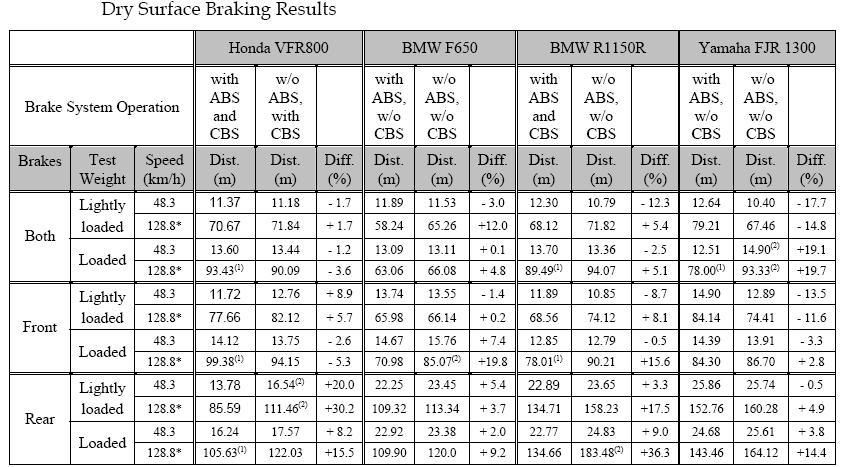Rain Dancer
Well-known member
Not at all, I am just saying that they need to be looked at closely to see what their control was, and what they actually surveyed.So, are you saying that we should ignore all statistical studies then? Just go with first hand experiences, gut feelings and conjecture?
Probably not. "Learning to ride well" would mean that you NEVER reach the point where the ABS would even activate. You would never put yourself into that position. My take is not that they are building ABS to protect the inept rider, but rather they are protecting any rider, even the most skilled, when put into an extreme situation.
The "ABS vs Skill" argument is not a particularly new one, nor limited to 2 wheel vehicles. It is easy to show that a non-ABS braking system can slightly outperform ABS in optimum conditions, when tire adhesion is uniform and predictable. The advantage of having a computer (which can think faster and more accurately than a human) electronically monitoring wheel slip and intervening when you've gone too far is mostly in circumstances that your brain, and your eyes are not capable of interpreting adequately.
Yes, by all means everyone should ride or drive like they don't have ABS. Only a complete fool would do otherwise. That is, right up until the point where you have gone too far and the ABS does activate, and then you have to be confident, practiced, and aware enough of the ABS functionality to use it correctly.
Here is where I was referencing the study. I feel learning to ride also encompasses learning to deal with the unexpected, such as a locked wheel when braking. The study didn't mention (that I saw) anything about the skill level of the riders. Go to the bar up the street from me any weekend in the summer, and you can hear stories of close calls and wrecks....almost all because a lot of those people can't not ride. So, if I use that group as my control for the study, have I proved ABS is wonderful, or that riders need better skills? My point is not that ABS is bad, but used as a crutch by some riders. A lot of modern ABS systems will pout stop me, I am sure. Yet every time I take an advanced course for refreshing my skills, I find I can stop in the top, and that when I speak to riders with ABS, a lot of them feel that the stopping practice we do are a waste because they have ABS and don't need it.
Smart aleck!I don't know anyone who "depends" on their ABS once a week, and I can't imagine where you got the information that ABS systems (or the new blind spot warning systems) have "caused" accidents when they were new technology. Was it from a statistical study, perhaps?
Some riders may intentionally activate their ABS weekly, or maybe even more often, but that doesn't mean that they are "depending" on it. There is a significant difference in that.
Just on this thread, and I am not calling anyone out, and maybe it was tongue in cheek…but “rarely a ride day goes by I don’t use ABS”, or “it gets used once a week”…for me, and this is only my opinion, that is too much. Did these riders fall a lot before ABS brakes?
Understood, and I agree. Debate is a valuable utility when it can be maintained without undue emotion. There is seldom a question that is so black and white that is beyond rational discussion and debate. Debate gets things out in the open so everyone can consider and make their own decisions. What could be wrong with that?
FWIW, in the last bit there you said that you "used the study" I posted a link to, but I don't see where you used it at all in your argument. You merely tried to discredit the study because it is statistical, which is fine. There have been many other studies that have been done experimentally, rather than statistically, and they all show that in adverse conditions the ABS results in shorter and more consistent stopping distances.
If I boil down your argument (and paraphrase) I think that your position is that a well trained and highly skilled rider (such as yourself) will always be able to outperform an ABS equipped one.
My position is: ...not always.
I wanted to mention that to you only because sometimes in writing, people can feel attacked since they can’t read the person. If I am ever able to ride again, I hope I can meet you sometime. I enjoy your views and how articulate you are at presenting them. And I practice my skills, and take pride in them, but I am FAR from a Rossi! (Much to my dismay)
And this was way off what Gitbox had started. Love following people doing major upgrades like he was contemplating. Guess a new FJR is in his future now?
BTW: I don't dislike ABS, or technology, just miss people using skill and common sense because of it.




